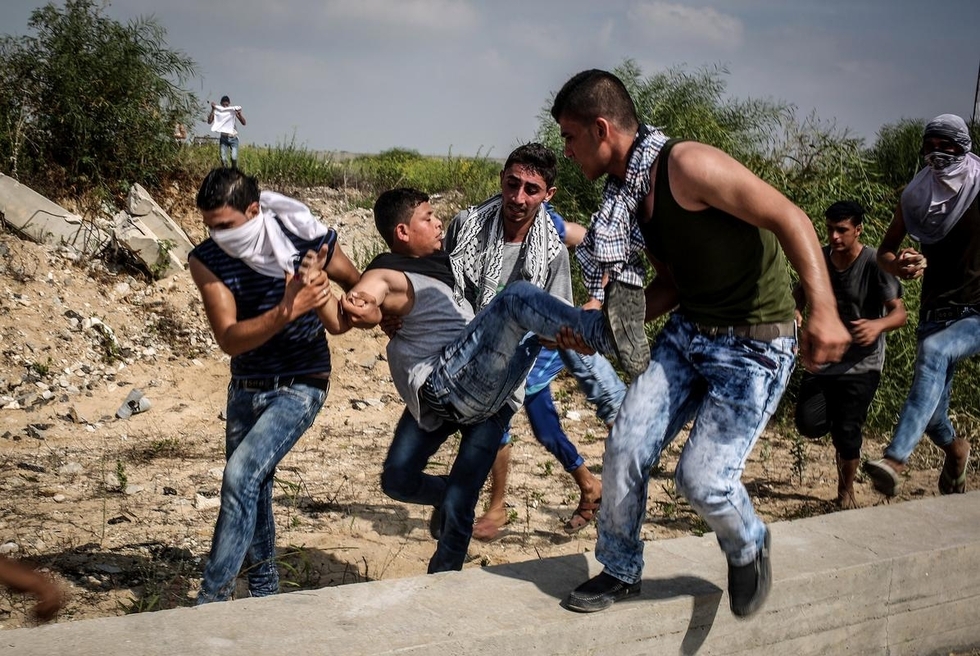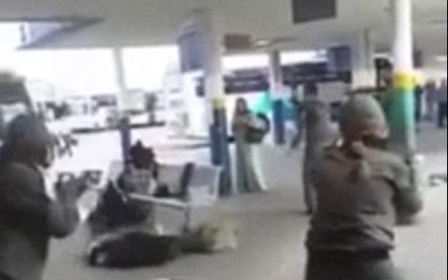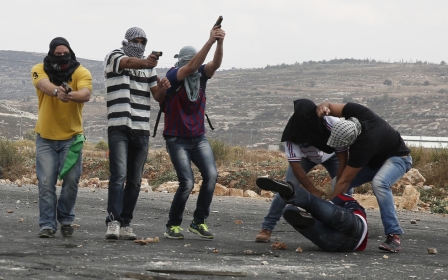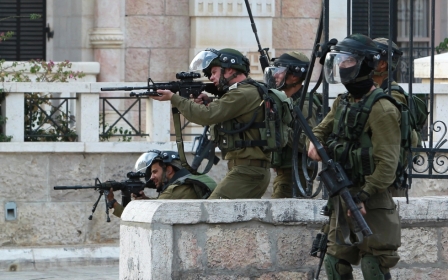Videos challenge Israeli police account of shootings

HAIFA, Israel - It has been called the “smartphone intifada”. After a sharp escalation in violence between Palestinians and Israelis in recent weeks, shocking scenes captured on video have spread across social media.
According to Israeli human rights organisations, several such videos challenge the accuracy of official Israeli accounts of the circumstances in which police have killed or injured Palestinians.
The footage, the nine groups said in a statement this week, provided concrete evidence that police were “quick to shoot to kill” rather than arrest Palestinians in Jerusalem and Israel who are suspected of involvement in attacks on Israelis Jews.
The shootings, they added, had occurred when the Palestinians posed no physical threat to security forces.
Lawyers have also accused the justice ministry of thwarting investigations, especially into the police killing of Fadi Alloun, a Palestinian from Jerusalem. Security camera footage of his shooting has been withheld and his family have been denied access to his body for an autopsy.
Israel and occupied East Jerusalem, which Israel has illegally annexed, are subject to Israeli civil law – unlike the West Bank, where Palestinians live under Israeli military rule.
Human rights groups have long complained that Israeli soldiers in the West Bank carry out “extra-judicial executions”.
The Israeli government recently announced it was authorising for the first time the use of live-fire against Palestinians, including children, who throw stones in Israel and Jerusalem.
Israel includes a population of 1.6 million Palestinians who have citizenship, while most of East Jerusalem’s 370,000 Palestinians have Israeli residency permits.
Adalah, a legal centre for Israel’s Palestinian citizens, said details of the government’s new live-fire regulations had yet to be divulged to them.
But it cited Israeli politicians and police commanders as openly calling for extra-judicial killings since the upswing in tensions.
‘Terrorists will not survive’
Jerusalem’s police chief, Moshe Edri, is reported to have said: “Anyone who stabs Jews or hurts innocent people is due to be killed.” Police minister Gilad Erdan similarly declared: “Every terrorist should know that he will not survive the attack he is about to commit.”
Adalah and Addameer, a Palestinian group defending prisoners’ rights, sent a letter to Israel’s attorney general this week highlighting three cases where video footage documented the unjustified shooting or abuse of Palestinian suspects.
Suhad Bishara, an Adalah lawyer, said the Israeli justice ministry had given no indication that its police investigations unit, Mahash, would investigate any of the incidents.
“What they are saying is the precise opposite: that these officers are heroes, that they behaved according to the law,” she said.
Mahash is already deeply mistrusted by Israel’s Palestinian minority, a fifth of the population, after it failed to identify any of the police officers responsible for killing 13 unarmed demonstrators inside Israel at the start of the second intifada in October 2000.
There have been 51 deaths of Palestinian citizens at the hands of the security forces since the October 2000 events, most in unexplained circumstances, compared to two Israeli Jews.
Bishara said: “We seem to have reached an even worse point than after the October 2000 events. Then Mahash conducted some investigations, even if they were deeply flawed. Now the need for investigations is simply being ignored.”
A spokeswoman for Mahash confirmed that a complaint from Adalah had been received but would make no further comment.
The urgent need for investigations was underscored late Thursday when the interior ministry, Silvan Shalom, said he intended to strip Palestinian-Israeli “terror suspects” of their citizenship and those in Jerusalem of their residency permits.
According to international law, countries should not leave their citizens stateless.
Body kept from family
Adalah and Addameer are concerned that in the most prominent of the filmed shootings - of Alloun on 4 October - Israeli officials are putting up obstacles to block any investigation.
Videos on social media show a policeman shooting dead 19-year-old Alloun as he seeks protection from a mob of Israeli Jews chasing him and demanding that he be executed.
The crowd accuses him of a stabbing that occurred moments earlier close to the Old City. Even though the film suggests he posed no physical threat at the time, a police officer fired at him seven times. Alloun fell to the ground after the first shot.
Morad Jadalah, a lawyer with Addameer, said the authorities had refused to make available footage from security cameras in the area that might provide a clearer view of what happened.
They had also denied Alloun’s family access to his body, and the police had buried him without an autopsy being carried out.
Adalah and Addameer accused the police of seeking to “disrupt the investigation in advance” and “damage essential factual findings”.
Jadalah said: “If we can’t examine Alloun’s body to see how he was killed, we have no case against the police in court, whatever the videos reveal. The authorities are engaged in attempts to prevent justice from being done.”
In another case taken up by Adalah, from 9 October, Israa Abed, a 30-year-old mother of three from Nazareth, is filmed surrounded by soldiers and police at a bus station in northern Israel. As she stands almost immobile before them, several shots are fired, wounding her.
Although the security services have claimed there was a knife in her hand, she can be seen making no effort to attack them. Another video, taken shortly after she was shot, appears to show a pair of sunglasses, not a knife, next to her.
Doctors have said she was shot six times from the same gun.
Shalom named Abed, who survived the shooting, as one of two Palestinian citizens he wanted to strip of their citizenship.
Boy left to bleed
In the third case, 13-year-old Ahmed Manasra is filmed being kicked by police and denied medical treatment as he lies bleeding and severely injured on a road in a settlement in East Jerusalem on 12 October. Crowds of settlers curse him and shout “Die! Son of a bitch.”
He was rammed by a vehicle after he and an older cousin were suspected of stabbing two Israeli Jews, one a child his own age.
Physicians for Human Rights in Israel decried a video and photos released by the government on Thursday of Manasra recovering in an Israeli hospital. They said the images violated Israel’s juvenile and privacy laws, and the hospital’s involvement was a severe breach of medical ethics.
Suspicions have been raised too about the fatal shooting of Basel Sidr on 14 October. Footage shows police shooting the 20-year-old as he tried to attack them with a knife at the entrance to Jerusalem’s Old City.
However, B’Tselem, an Israeli organisation monitoring Israeli violations in the occupied territories, expressed “grave concern” that the officers continued to shoot at Sidr after he was wounded on the ground with no one near him.
Jadalah, of Addameer, said: “These videos are helping to fuel Palestinian rage. They reinforce the sense in Jerusalem that we are fighting for our lives and the city.”
Since the start of the month, 32 Palestinians have been killed and hundreds wounded. Attacks have left seven Israeli Jews dead.
On Wednesday thousands of soldiers and paramilitary Border Police were deployed in Jerusalem and major cities in Israel where Palestinians live. It is the first time in more than a decade soldiers have been used inside Israel.
8,000 gun permit requests
Meanwhile, Israeli media reports indicate that, since the unrest erupted, Israeli soldiers and police have had a light finger on the trigger and have rushed to conclusions about the threat posed by Palestinians unsupported by evidence.
On Thursday a soldier opened fire in a train near Haifa, causing minor injuries, after other soldiers wrongly shouted out a warning that someone was holding a knife.
Later the same day, police admitted that two Palestinians from East Jerusalem arrested on suspicion of planning an attack after a major manhunt in Tel Aviv were simply visiting the city.
Israeli politicians such as Jerusalem’s mayor Nir Barkat have called on Israeli civilians who own a firearm to carry it at all times. On Friday some 8,000 Jews were reported to have applied for a gun permit in the first 24 hours after the easing of licensing rules by the government.
“In the current atmosphere, the call by politicians for Israeli civilians to arm themselves constitutes incitement to kill Palestinians for no reason,” said Bishara, of Adalah. “It sends a message to the security forces and to Israeli civilians that Arab life is of no value.”
There has also been a spate of reports in the past week of Palestinian citizens being beaten or stabbed by Israeli Jews after they were identified as Arab. Mobs of Jews chanting “Death to Arabs” are now a familiar sight in Jerusalem.
In the southern town of Dimona last week, an Israeli Jew stabbed four Palestinians over the course of an hour.
Jadalah said: “When Israeli Jews carry out knife attacks, they are arrested, not killed. It seems the police can follow proper procedures when Jews are involved.”
Ahmed Tibi, a Palestinian member of the Israeli parliament, echoed Jadalah on Twitter: “Of course the Jewish stabber ended the spree [of stabbings] without a bullet or scratch.”
Rami Nasreddin, the director of Palvision, a youth empowerment programme in Jerusalem, said videos of violence by the security forces and of Jewish mobs had left many Palestinians in Jerusalem frightened to go out.
“Most of the schools are closed because parents are afraid to let their children on to the streets,” he said.
“I have to admit I am scared myself. I know that if a settler shouts out that I have a knife or that I am a terrorist, the police are likely to shoot me without a second thought.”
New MEE newsletter: Jerusalem Dispatch
Sign up to get the latest insights and analysis on Israel-Palestine, alongside Turkey Unpacked and other MEE newsletters
Middle East Eye delivers independent and unrivalled coverage and analysis of the Middle East, North Africa and beyond. To learn more about republishing this content and the associated fees, please fill out this form. More about MEE can be found here.




